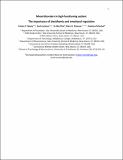Files in this item
Mood disorders in high-functioning autism : the importance of alexithymia and emotional regulation
Item metadata
| dc.contributor.author | Morie, Kristen P. | |
| dc.contributor.author | Jackson, Scott | |
| dc.contributor.author | Zhai, Zu Wei | |
| dc.contributor.author | Potenza, Marc N. | |
| dc.contributor.author | Dritschel, Barbara | |
| dc.date.accessioned | 2020-04-25T23:34:02Z | |
| dc.date.available | 2020-04-25T23:34:02Z | |
| dc.date.issued | 2019-07 | |
| dc.identifier | 258995136 | |
| dc.identifier | 21ef60a5-e672-40ad-aa79-02ad6ef73a78 | |
| dc.identifier | 85065033785 | |
| dc.identifier | 000474414900023 | |
| dc.identifier.citation | Morie , K P , Jackson , S , Zhai , Z W , Potenza , M N & Dritschel , B 2019 , ' Mood disorders in high-functioning autism : the importance of alexithymia and emotional regulation ' , Journal of Autism and Developmental Disorders , vol. 49 , no. 7 , pp. 2935-2945 . https://doi.org/10.1007/s10803-019-04020-1 | en |
| dc.identifier.issn | 0162-3257 | |
| dc.identifier.other | ORCID: /0000-0002-0909-6323/work/64698263 | |
| dc.identifier.uri | https://hdl.handle.net/10023/19855 | |
| dc.description | KPM received support from MH018268-31 and receives support from K01DA042937. SJ received support from MH018268-33. MNP receives support from the Connecticut Council on Problem Gambling, and the Connecticut Department of Mental Health and Addiction Services. | en |
| dc.description.abstract | Individuals with autism spectrum disorder (ASD) often have co-morbid anxiety and depression. Alexithymia and emotion regulation difficulties are commonly seen in individuals with ASD and in mood disorders. We hypothesized that alexithymia and emotional regulation would mediate the relationship between autistic features and anxiety/depression symptom severity. We collected data about emotional regulation, alexithymia, autistic symptoms and depression/anxiety in a sample of 64 young adults with ASD. We constructed two serial multiple mediator models, using autistic features as the independent variable and anxiety/depression symptoms as outcome variables. The serial relationship between alexithymia and emotional regulation mediated associations between autistic features and depression and anxiety, separately. The findings suggest that targeting alexithymia may benefit therapies designed to alleviate mood disorders in ASD. | |
| dc.format.extent | 11 | |
| dc.format.extent | 785525 | |
| dc.language.iso | eng | |
| dc.relation.ispartof | Journal of Autism and Developmental Disorders | en |
| dc.subject | Alexithymia | en |
| dc.subject | ASD | en |
| dc.subject | Autism | en |
| dc.subject | Emotional regulation | en |
| dc.subject | Mood disorders | en |
| dc.subject | BF Psychology | en |
| dc.subject | Developmental and Educational Psychology | en |
| dc.subject | NDAS | en |
| dc.subject | BDC | en |
| dc.subject.lcc | BF | en |
| dc.title | Mood disorders in high-functioning autism : the importance of alexithymia and emotional regulation | en |
| dc.type | Journal article | en |
| dc.contributor.institution | University of St Andrews. School of Psychology and Neuroscience | en |
| dc.contributor.institution | University of St Andrews. Institute of Behavioural and Neural Sciences | en |
| dc.identifier.doi | https://doi.org/10.1007/s10803-019-04020-1 | |
| dc.description.status | Peer reviewed | en |
| dc.date.embargoedUntil | 2020-04-26 |
This item appears in the following Collection(s)
Items in the St Andrews Research Repository are protected by copyright, with all rights reserved, unless otherwise indicated.

